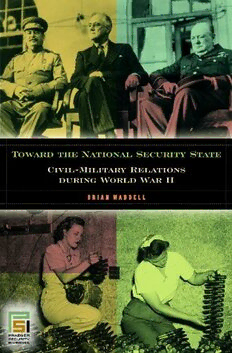
Toward the National Security State: Civil-Military Relations during World War II PDF
216 Pages·2008·20.283 MB·English
Most books are stored in the elastic cloud where traffic is expensive. For this reason, we have a limit on daily download.
Preview Toward the National Security State: Civil-Military Relations during World War II
Description:
American involvement in World War II greatly transformed U.S. civil-military relations by propelling the U.S. military into a prominent position within the national government. The war established new linkages and a new unity between key civilian and military personnel. And these new civil-military relations became institutionalized with the postwar creation of the national security state. Waddell explores these new developments and examines how they affected the very nature of American governmental power.War is considered the most significant influence on building and transforming government institutions. And yet, scholars interested in American political development tend to ignore World War II while focusing on the Great Depression and Roosevelt's New Deal. In turn, scholars who focus on the war tend to focus on the diplomacy, strategies, battles, and personalities that dominated the war itself. Rarely is the war considered from the perspective of how it changed the fundamental nature of American government as it led to the national security state, the military-industrial complex, and the militarization of foreign policy. This book places these dramatic shifts in the context of the changing civil-military relations of World War II. It examines these relations in terms of the three central areas of modern warfare-production, strategy, and manpower. Chapters focus on the military-corporate relations involved in mobilizing the arsenal of democracy; top-level command relations between President Franklin D. Roosevelt and his military commanders; and the civil-military tensions and relations involved in mobilizing a mass citizen army. A final chapter analyzes what came of these changes as the U.S. institutionalized a striking new civil-military unity in and through the postwar national security state.
See more
The list of books you might like
Most books are stored in the elastic cloud where traffic is expensive. For this reason, we have a limit on daily download.
